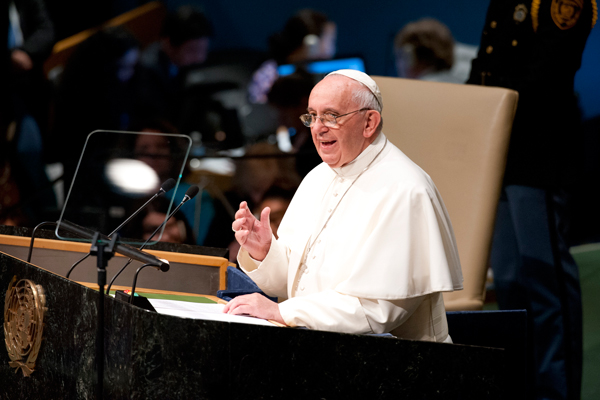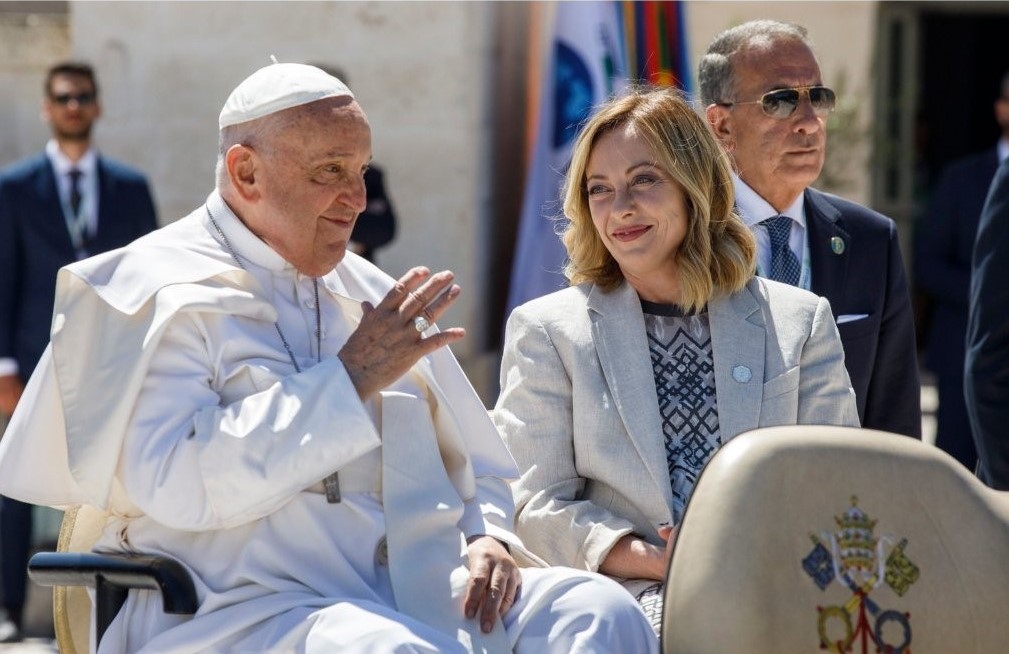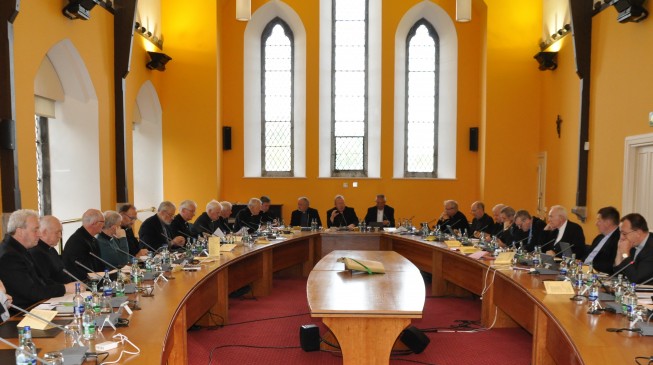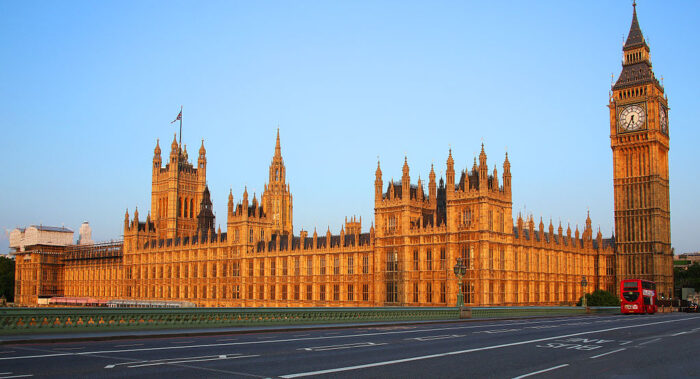
A Catholic missionary in Aleppo, Syria, sees reasons for hope, despite the fear many Christians have about Islamist groups.
Hay’at Tahrir al-Sham (HTS), the principal insurgent group, is formed by Sunni militants and led by a former member of Al Qaeda who cut ties with the Islamic radicals in 2016.
“In 2012, 2013, insurgent groups targeted Christians and other minorities in some regions. So, many people now feared that something like that could happen again and left their houses,” Argentinian-born Father Hugo Alaniz explained.
However, on Dec. 9, Alaniz and other religious leaders met with members of HTS. They were told that no church will be closed, and that Christians will be respected.
“They said that minorities will be treated well. Women will not be obliged to wear a hijab. The days off will be Thursdays and Fridays, but for Christian children they will remain Saturdays and Sundays,” Alaniz said.
“They apparently have good intentions. They told us that they will rule for the minorities. I hope so,” he said.

Bible sales are up 22% in the U.S. through the end of October, compared with the same period last year, according to book tracker Circana BookScan. By contrast, total U.S. print book sales were up less than 1% in that period.
The demand for Bibles is rising despite some evidence that the country is growing increasingly secularised.
The Pew Research Center found that about 28% of adults in the U.S. now consider themselves religiously unaffiliated. Yet Bible sales rose to 14.2 million in 2023 from 9.7 million in 2019, and hit 13.7 million in the first 10 months of this year. Readers are also stocking up on related titles that provide guidance, insights and context—even sets of stickers to flag particularly meaningful passages.
Publishers say the books are selling well at religious bookstores, but also on Amazon.com and at more mainstream retailers. People buy print copies to make notes in and highlight, but often supplement them with audiobooks as well.

Switzerland’s highest court has decided parents separated from their daughter for refusing to endorse her gender “transition” must enable their child’s legal “sex change” or face the possibility of criminal charges.
The parents argued that both the Swiss Federal Constitution and international law protected their right to act in their daughter’s best interest by not enabling the legal change.
But the Supreme Court has now rejected their appeal.
A further appeal to the European Court of Human Rights is being considered to protect the parents’ rights to care for their daughter without state interference.
The child’s father reacted to the ruling: “We are heartbroken. We love our daughter and only want what’s best for her. We know this decision is not in her best interest.
“That we could face criminal charges for simply trying to care for our daughter shows how deeply embedded transgender ideology is in Swiss institutions and the real harms it causes,” he said.

The Irish Fiscal Advisory Council has said in a new report that Ireland’s rapidly ageing population is the foremost challenge facing the State, even ahead of the green energy transition.
However, it offered suggestions only on managing the financial fallout, rather than increasing the fertility rate. Ireland’s rate is now 1.5, well below the replacement level of 2.1.
The report, published last week, says the population aged 66 and over is set to almost double over the next 30 years. By contrast, the working age population will remain broadly stable. As a result, the number of workers for every pensioner is likely to fall from 3.5 to 3 by 2030 and to fall towards 2 by 2050.
“This transformation of the population is rapid by international standards,” the report warns, adding that it will put pressure on the state to provide more healthcare, long-term care and pension payments.
The report cautions that an older population will also mean slower growth in the economy, and hence in tax revenues. Under existing policies, it says this will push up Ireland’s debt ratio.
The report urges for “action sooner rather than later” because this will ultimately be less costly.

Fianna Fáil Minister of State for International Development and Diaspora, Sean Fleming, says he is “very honoured” to have been given a private audience with Pope Francis.
The meeting occurred during a visit to Rome and Vatican City on a diplomatic mission last week.
“I am very honoured to have a private audience with the Holy Father and to have the opportunity to recognise the role he and the Holy See plays in building peace,” Fleming said ahead of the trip, adding: “In an uncertain world, this work is more important than ever.”
He went on to highlight the deep historical connections between the Catholic faith and Irish culture.
“The people-to-people links between Ireland and Italy and the Vatican go back centuries,” he said.
Minister Fleming is also set to meet Cardinal Pietro Parolin, the Vatican Secretary of State, to discuss bilateral relations and geopolitical matters.

A God-inspired sense of hope is necessary in our schools to combat the shadow of nihilism, according to a leading Catholic educationalist.
Speaking to The Irish Catholic, Sr Anne Neylon DC, Primary Diocesan Advisor, said: “That sense of nihilism in our world is erasing hope”.
“To think that there are 250 million children globally without access to education is a terrible statistic. Some 250 million children and adolescents do not attend school.” She called on school leaders to remain “thirsty and have dreams.”
Ireland, Sr Anne said, has “a very good education system,” but faith must also be nurtured personally. “Taking personal responsibility for faith, taking time to reflect, and believing that God loves me as I am – it’s that simple.”
She also praised the example of saints, particularly Carlo Acutis, who she believes will inspire the young. “We need to avoid pessimism – it comes from secularism,” she said.
While acknowledging challenges in Ireland, including school closures, Sr Anne pointed the importance of collaboration between culture and education. “It takes each one of us to be responsible in our faith… The voice of God must be heard.”

Italy’s criminalising of surrogacy both at home and abroad could be replicated in other nations, according to experts.
“Italy is an example to follow for other countries,” Bernard Garcia Larrain, a lawyer and international anti-surrogacy advocate, told CNA.
Garcia Larrain is the coordinator of the Casablanca Declaration, an international group calling for the abolition of surrogacy worldwide.
On Oct. 16, Italy’s Senate passed a bill making it possible to prosecute Italian citizens for pursuing surrogacy abroad. The practice was already a crime within Italian borders.
Garcia Larrain told CNA that national regulation of surrogacy is not enough, because surrogacy “is a global market,” which is why the group he coordinates is calling for its universal abolition for the protection of children and women.
In the meantime, however, the lawyer said Italy has taken a good first step that he hopes other countries will follow.

The incoming Government need to prioritise end of life care and not legislate for ‘assisted suicide’, the Catholic hierarchy has said in a statement following their latest quarterly meeting.
They urged newly elected TDs “to promote the dignity of every human person and the common good at all times”.
“We appeal [to] them to uphold human life at all its stages, and to prioritise the provision of palliative care for people living with chronic and terminal illness.”
The Bishops added: “Assisted suicide, far from being an expression of autonomy, is a failure of care. By legislating for assisted suicide or euthanasia, the State would contribute to undermining the confidence of people who are terminally ill, who want to be cared for and want to live life as fully as possible until death naturally comes.
“In our culture, we rightly hold doctors and nurses in high esteem because they are presumed always to be at the service of life, for as long as their patient lives. We call on Catholics to stand firmly in support of nurses and doctors who stand for life.”

An Irish commentator who voted for same-sex marriage and to repeal the 8th Amendment, but is also a Mass-goer, has highlighted the amount of on-line abuse she receives because of her Mass-going.
Writing in The Irish Independent today, Ellen Coyne says: “Some of the nastiest abuse I’ve ever gotten online was from people on the left who were mocking my faith. In a truly secular society that has thankfully moved on from our traumatising past, I don’t understand how a person’s religion is fair game for derision”.
She also says that politicians should not be forced to disregard their faith when forming views on matters of conscience.
She says that too many people only see religion as “a corrupting influence on Irish politicians”.
Ms Coyne notes that it would be “egregiously cruel” for any TD to feel “under pressure to lie about the influence that religion can have on their personal principles”.
“But on an issue as profound as assisted dying, it’s right and proper for a politician to consult their conscience and consider the influence that their religion may have on that”.
Coyne is the author of ‘Are You There, God? It’s Me, Ellen’.

MPs opposing an ‘assisted dying’ bill have launched a rearguard action to toughen up safeguarding measures in the draft legislation and avoid a “stitch-up”. The aim of the bill is to allow those within six months of death to kill themselves with a lethal drug given to them by a doctor.
Senior Labour, Conservative and Liberal Democrat figures who voted against the landmark bill last Friday are demanding to be included in the group of MPs responsible for considering potential amendments.
They have written to Kim Leadbeater, the Labour backbencher whose bill passed its first parliamentary hurdle with a majority of 55 at the second reading stage.
In a bid to keep up pressure on the issue, opponents of the bill have urged Leadbeater to appoint eight leading critics to the committee that will scrutinise the bill over the coming five months. Among those who want to be included are Rachael Maskell, a former Labour shadow minister, and Tory MP, Danny Kruger, who was the first to speak against Leadbeater’s bill in last Friday’s debate.
The public bill committee will call witnesses, ask for written evidence and go through the bill line by line, making space on it hotly contested by those seeking to toughen up the legislation.